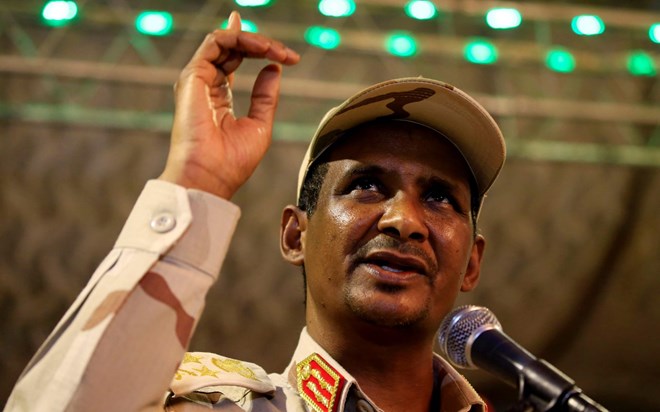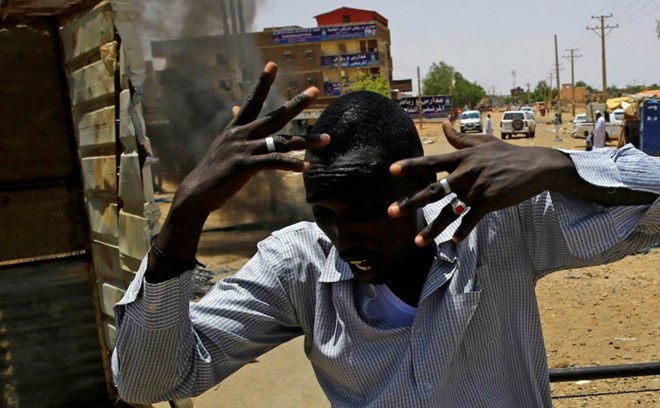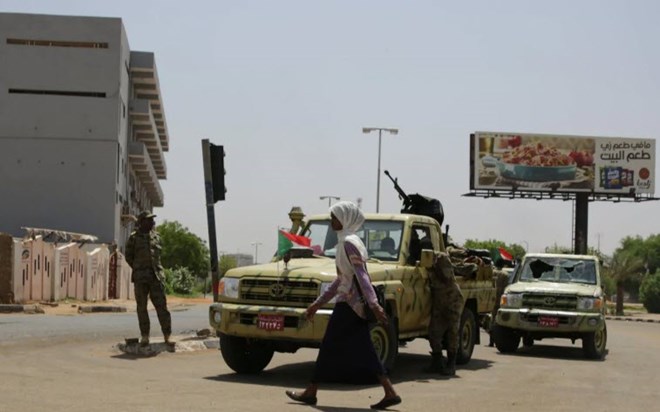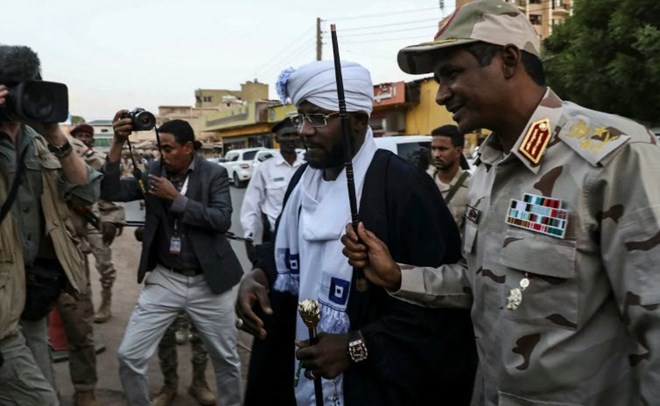
Sunday June 9, 2019
By Roland Oliphant

General Mohamed Hamdan Dagalo, known as Hemedti, is poised to control Sudan if he can crush the protest movement that overthrew Bashir CREDIT: REUTERS
It was an act of intimidation so bizarre that Mohammed barely understood what was happening until it was over.
The young soldier who had stopped and searched his car on the streets of Khartoum earlier this week suddenly grabbed a shock of his hair, drew a combat knife, and sheared it off.
“Sudan belongs to us now,” said the young soldier, before allowing him to leave. “We own this country.”
The motorist got off lightly.
Dozens, possibly hundreds, of people have been shot, beaten, and robbed by rampaging security forces since Sudan’s military rulers launched their bloody crackdown on pro-democracy demonstrators in Khartoum on Monday.
Symbolic scalpings are the least of the humiliations.There have been consistent reports of rape. Bodies weighted with concrete have been pulled from the Nile.
An internet blackout imposed by the regime has made it difficult to count the exact scale of the crisis, but by Friday a doctor’s association aligned with the protest movement had counted at least 113 deaths.

A Sudanese protester gestures as he runs past a barricade along a street, demanding that the country's Transitional Military Council hand over power to civilians CREDIT: REUTERS
It has been a horrific week is the usually bustling and safe Sudanese capital. And the thuggish militia man with the knife was right: balance of power in Sudan has changed dramatically, and in a terrifying way.
Up until a week ago, the pro-democracy protesters whose massive demonstrations brought down Omar Bashir’s dictatorship in April still appeared to be on the verge of power.
Their massive sit-in protest outside army headquarters had become the beating heart of a national revolutionary movement, attracting hundreds of thousands of people of all backgrounds to sing, debate, make art, and drink in the rare, intoxicating euphoria that only follows the fall of a tyrant.
But it was more than a street party - it was part of a deadly serious struggle for power.
By keeping people on the streets, the pro-democracy movement sought to maintain pressure on the Transitional Military Council, the group of general who had mounted a coup against Bashir, to allow civilian rule.
When the generals unleashed the Rapid Support Forces, a militia linked to atrocities in Darfur, to clear the sit-in on Monday morning, they were trying to extinguish both the spirit and the power of the revolution.
The Sudanese Professionals Association, the main group behind this year's remarkable uprising, has refused to surrender, vowing to fight the brutality with a campaign of civil disobedience.
But the sense of shock in Khartoum is palpable.
“To be honest, the old spirit has done down. People have seen 40 people killed in one day,” said Sarmed, a 24 year old protester who has been involved in the revolutionary movement since the uprising in Bashir began in December.
“There are still people who are willing to die for the cause, but there are fewer of them. There is a sense of betrayal because the army did not intervene,” he added.
The suspected architect and main beneficiary of the slaughter is Lieutenant General Mohammed Hamdan Dagalo, the deputy chairman of the Transitional Military council and the commander of the RSF.
A former camel-trader from a Chadian tribe with neither an education or formal military training, Hemedti, as he is known, is an unlikely candidate for power.

Sudanese woman walks past a Sudanese Rapid Support Forces (RSF) vehicle stationed in an intersection leading to the sit-in site outside the Sudanese army Headquarters CREDIT: REX
One former member of Sudan’s National Intelligence and Security Service (NISS), the feared secret police that for years kept Bashir in power, described Hemedeti derisively as “a donkey thief who graduated to Toyotas.”
“Like any society, Sudan's is stratified, and by almost any count that matters, he is at the bottom. Yet he is poised to take over the country,” said Cameron Hudson, a former CIA analyst and Sudan watcher at the Atlantic council.
But even his harshest critics acknowledge his brutality combines ruthless mercenary opportunism, a charismatic persona, and an uncanny ability to sense where political and military winds are blowing.
Hemedti began his fighting career began when war broke out in Darfur in 2003 and he joined what would become the Janjaweed militia, an irregular pro-government force accused of committing genocide against the region’s non-Arab population. The unit he led at the time has been accused to mass rapes and killings.
But the former NISS officer, who served in Darfur in the 2000s, claimed Hemedti’s primary motivation was simply to get rich, fighting and trading with both sides as convenient.

Hemedti arrives for a Ramadan event in Khartoum CREDIT: AP
“Back then, a convoy would leave Khartoum for Darfur every ten days. At one point Hemedti and his gang started raiding the convoys. It was his old hobby of robbing the people, but instead of sheep and donkeys he was stealing fuel which he sold to rebels,” the officer, who spoke on condition of anonymity, told the Telegraph.
Eventually, he said, NISS managed to arrest him in 2008, fighting off an attempt by his gang to bust him out of jail in the process. “The interrogators beat him badly the whole time, but he was fearless - he just swore at them,” said the officer, who said he was involved in the arrest.
Shortly afterwards, the officer’s unit was recalled to Khartoum, where they learnt to their fury that their prisoner had been released, given a NISS uniform and persuaded to lead his gang against the rebels.
It was typical of the physical courage, and sheer mercenary opportunism, uncanny ability to bend with the political winds that has characterized Hemedti's entire career.
In 2013, his former Janjaweed outfit was renamed the Rapid Support Forces, separated from NISS and placed directly under president Omar Bashir, who promoted Hemedti to the impossibly senior rank of lieutenant general and lavished generous funding on the RSF to balance the power of the army and security service.
But when protests against Bashir broke out in December, Hemedti - to the surprise of many - turned on his patron, publicly saying he would not fire on demonstrators and demanding the government address their grievances.
“The corrupt, whoever they are, should be referred to justice,” he said at the time.
He took part in the April 11 coup against Bashir and won the grudging respect of some oppositionists by visiting wounded protestors in hospital and describing how he had refused the dictator's orders to disperse them.
That he this week launched the very bloodbath he had refused to carry out for his former boss is entirely in character.
Today he effectively rules Sudan's capital city, with 15,000 RSF troops in up-gunned Toyota pickup trucks controlling every major intersection, bridge, and thoroughfare around Khartoum.
With the revolutionaries swept aside, and with backing from regional superpowers Saudi Arabia, Egypt, and UAE, he is closer to ultimate power than ever.
But his next gamble maybe his bloodiest yet.
The capital is also patrolled by troops from the regular Sudanese Armed Forces, who have more guns, more men, and an ill-disguised contempt for both Hemedti and the former Janjaweed RSF. And Lieutenant General Abdel Fattah al-Burhan, the head of the Transitional Military Council, may have his own ideas about who should rule the country.
The National Intelligence and Security Service, also fields an army of thousands of heavily armed paramilitary troops. Major General Salah Gosh, NISS’ former commander, has kept a low profile since Bashir was overthrown but is still considered one of the cleverest and most dangerous figures in the country.
Then there are the “shadow militias” - semi official part-time fighters attached to Islamist parties who were empowered by Bashir’s regime.
The prospect of a junta headed by Hemedti could well prompt a counter-coup by junior army officers, said Eric Reese, a Sudan watcher who has followed Hemeti’s career since the 2000s.
“But Hemedti is all in. He can’t go back to Darfur, and there is no limit on what he would do to acquire power in Khartoum,” he said.